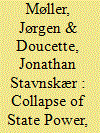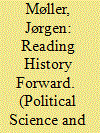|
|
|
Sort Order |
|
|
|
Items / Page
|
|
|
|
|
|
|
| Srl | Item |
| 1 |
ID:
177787


|
|
|
|
|
| Summary/Abstract |
Several generations of scholarship have identified the medieval development of urban self-government as crucial for European patterns of state formation. However, extant theories, emphasizing structural factors such as initial endowments and warfare, do little to explain the initial emergence of institutions of urban self-government before CE 1200 or why similar institutions did not emerge outside of Europe. We argue that a large-scale collapse of public authority in the ninth and tenth centuries allowed a bottom-up reform movement in West Francia (the Cluniac movement), directed by clergy but with popular backing, to push for ecclesiastical autonomy and asceticism in the eleventh and twelfth centuries. These social realignments, facilitated by new norms about ecclesiastical office holding, stimulated the urban associationalism that led to the initial emergence of autonomous town councils. Using a panel data set of 643 towns in the period between 800 and 1800, we show that medieval towns were substantially more likely to establish autonomous town councils in the period between 1000 and 1200 if they were situated in the vicinity of Cluniac monasteries. These findings are corroborated by regressions that use distance from Cluny—the movement's place of origin—to instrument for proximity to Cluniac monasteries.
|
|
|
|
|
|
|
|
|
|
|
|
|
|
|
|
| 2 |
ID:
162666


|
|
|
|
|
| Summary/Abstract |
Recent attempts to explain the development of medieval representative institutions have neglected a long-standing insight of medieval and legal historians: Political representation and rule by consent were first developed within the Catholic Church following the eleventh-century Gregorian Reforms and the subsequent “crisis of church and state”. These practices then migrated to secular polities in the thirteenth and fourteenth centuries. This was facilitated by the towering position of the Church in medieval society in general and the ubiquitous “areas of interaction” between religious and lay spheres in particular. I document these processes by analyzing the initial adoption of proctorial representation and consent at political assemblies, first, within the Church, then in lay polities. These findings corroborate recent insights about the importance of religious institutions and diffusion in processes of regime change, and they shed light on the puzzling fact that representation and consent—the core principles of modern democracy—only arose and spread in the Latin west.
|
|
|
|
|
|
|
|
|
|
|
|
|
|
|
|
| 3 |
ID:
172689


|
|
|
|
|
| Summary/Abstract |
Political scientists increasingly enlist the work of historians but they often treat this work in a nonchalant or superficial way, which makes their evidentiary record questionable. It follows that we need to check the validity of the interpretation of historians’ work in review processes. This article argues that enlisting historians as reviewers is not the answer. Instead, it proposes four simple criteria that can be used to flag situations in which the use of historians’ work as empirical evidence is unconvincing. The general purpose of the article is to increase awareness about what is at stake when political scientists base empirical analysis on evidence gathered by historians.
|
|
|
|
|
|
|
|
|
|
|
|
|
|
|
|
| 4 |
ID:
186714


|
|
|
|
|
| Summary/Abstract |
The ongoing “historical turn” in political science makes it more important than ever that we, as a profession, have open conversations about the nature of the evidence we enlist from trained historians. This article emphasizes that “history” should be recognized as an—often speculative and incomplete—interpretation of bygone times and places that we no longer can know for sure. Much of what we commonly believe about the past depends on narrative sources written long after the fact and influenced by later circumstances and points of view, on outdated historical research, or on singular and often biased contemporary sources. Discussing how to respond to this “problem of history,” the article calls for a shift of cognitive style: that is, treating the work of historians in a more self-conscious and critical way and clearly signaling this when we present our research. Three more particular guidelines—be up-to-date, be specific, and be cautious—exemplify this approach.
|
|
|
|
|
|
|
|
|
|
|
|
|
|
|
|
| 5 |
ID:
179424


|
|
|
|
|
| Summary/Abstract |
Recent decades have seen a productive methodological debate about how political scientists “do history.” However, on one important point, the discussion has been surprisingly thin. This concerns the problem of reading history backward rather than forward. To understand this problem, we need to embed it in broader methodological discussions of how the selection of evidence is shaped (and potentially biased) by all sorts of prior assumptions going into the evidence-collection process. Thus, reading history backward makes scholars refrain from posing certain questions, become blind to certain descriptive developments and explanatory factors, and fail to enlist certain historical data. This article pulls together the fragmentary insights about this problem and devises an alternative, prospective approach centered on an open reading of the work of historians. Although this is a “low-tech” issue, it is one that has huge ramifications for the way we do historical analysis as political scientists.
|
|
|
|
|
|
|
|
|
|
|
|
|
|
|
|
|
|
|
|
|